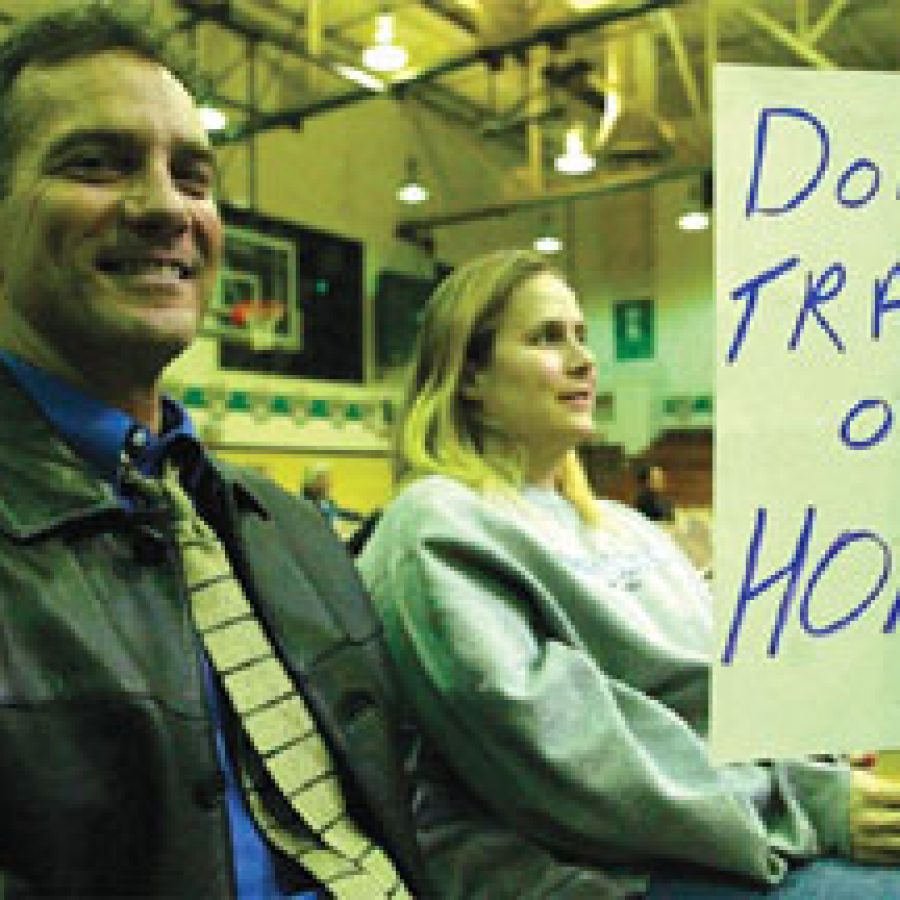County Councilman John Campisi, R-south county, recently disclosed information that he believes will stop Fred Weber Inc. from constructing a trash-transfer station at its South Quarry location in Oakville.
More than 500 people attended a public hearing last week conducted by the St. Louis County Department of Health on an application by a subsidiary of Fred Weber Inc., F.W. Disposal South, to operate a trash-transfer station at 4200 Baumgartner Road. The health department earlier this year rejected Fred Weber Inc.’s proposal to operate a transfer station at 5219 Baumgartner Road after determining the station would be hazardous to public health.
The County Council also instituted a six-month freeze on the issuance of permits for trash- transfer stations and other solid-waste treatment facilities to give the county time to draft updated solid-waste regulations, but Fred Weber submitted its current application for 4200 Baumgartner Road just minutes before the moratorium took effect in October.
Since then, Campisi and his assistant, Lou Chiodini, have been digging into county files looking for documentation that would prohibit a transfer station in Fred Weber’s South Quarry. And, according to Campisi, they recently uncovered that documentation — a conditional-use permit from 1970 that imposed certain restrictions on operations conducted at the quarry site.
“No dumping of debris or organic materials will be permitted on this property,” Campisi read to members of the public last week, which was followed by clapping and yelling.
This means no transfer station ever can be constructed in the quarry, Campisi told the Call.
Also, Chiodini and Campisi discovered that after 15 years of the quarry’s operation, a restoration plan was supposed to be submitted identifying how water, drainage, and land contours were to be restored, but no restoration proposal ever was submitted to the county.
Campisi was scheduled to travel out of town for several weeks, but once he returns, he said in January he plans on taking action.
He read more details from the 1970 agreement that stated:
No debris, stone, waste or materials shall be deposited into the Mattese Creek or Meramec River.
Quarrying operations shall only be conducted between the hours of 6 a.m. and 6 p.m. on any day excluding Sundays or legal holidays.
There shall be no emission of toxic, noxious, or corrosive fumes or gases at the property line.
All equipment in quarrying operation shall be operated by muffled internal combustion engines or by electric motors.
Quarrying operations shall be so operated that no offensive or objectionable odor will be perceptible at any point on the lot line of the quarry property.
Everyone who spoke after Campisi opposed the transfer station, with many upset that the hearing was even being conducted after previous hearings and repeated opposition to transfer stations in Oakville.
Several speakers gave their time to Tom Diehl of Oakville to speak on their behalf, and Diehl claimed much of the data in the current application is false.
“I believe this latest proposal is just another example of corporate greed, deceit and incompetence that threatens the health and general welfare of residents and environment of St. Louis County and shows nothing but contempt and disrespect for the St. Louis County Health Department,” Diehl said. “I don’t know if F.W. Disposal South’s application is the most carelessly prepared document, or the most cunning piece of misinformation crafted to mislead anyone who must read it.”
State Rep. Sue Schoemehl, D-Oakville, also spoke, noting that residents of her district have been fighting Fred Weber’s presence in Oakville for more than a year.
“My constituents, the residents of Oakville, have been fighting to protect their communities from environmental threats to their health, their safe streets and the clean air they breathe,” Schoemehl said, adding that she is angered and disappointed with Fred Weber representatives who have misled not only the Department of Health, but also the taxpaying citizens of Oakville.
She urged the health department to listen to her constituents and reject the application.
Sandy Parker spoke on behalf of Sen. Anita Yeckel, R-Sunset Hills, and urged the county to enact more legislation that would place stricter requirements on solid waste facilities.
Speaking on her own behalf, Parker, who lives in a subdivision behind the quarry site, also said, “I certainly would like to add that if Thomas Dunne (president of Fred Weber) were here tonight, he should be appalled at what he’s trying to do. Fred Weber never would have allowed something like this to happen, and if they’re going to call it F.W. Disposal, maybe they should call it Tom Dunne Disposal.”
She added that she was appalled the county let another hearing for an Oakville transfer station occur when it is obvious residents don’t want one.
“They’ve come down to this area twice before,” she said. “You keep coming back to the people. The people have Christmas to think about and not be standing here fighting these men.”
Despite the multitude of speakers voicing opposition during the hearing and the more than 500 residents present, Derrick Standley of Genesis Solid Waste Group, a consultant for Fred Weber Inc., said the people of south county are beginning to understand transfer stations are beneficial.
“They’re (transfer stations) here to help people. And I think by the attendance at the hearing tonight, it’s evident: Most residents of south St. Louis County get it,” Standley told the Call, noting there were 300 fewer people present than during the last public hearing that was conducted this summer at Oakville Senior High School.
However, he acknowledged there still are people who are vehemently opposed to transfer stations, but, he said, Fred Weber will carry almost half of the region’s total solid waste capacity in the future. He said Weber, and other transfer sites in the area, cannot carry that burden if more transfer stations are not added to the region.
“I understand that people who live close to these facilities, until they actually see it’s not going to hurt them, they don’t really want to take that chance,” Standley said. “And I understand that. I actually am fairly sympathetic to fear of the unknown.”
The real problem, he said, is how Missouri is improperly handling its mass amounts of solid waste and more transfer stations are needed to help alleviate the problem.
“If you want to get down to one thing that this is all about, it’s Missouri — we have to deal with our problems. And part of that is taking responsibility,” Standley said. “We need these facilities. It’s what’s right for our children and it’s what’s right for the environment. It’s not going to hurt people’s property values.”









